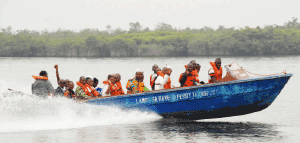The Lagos lagoon looms large and untamed, waiting to be conquered; but it would seem like the time this will happen is far in the future. Assistant Life Editor, TERH AGBEDEH, examines the potential that the waterways in Lagos hold for transportation…
For three years, the founder of Nigeria Broadcasting Merit Awards (NBMA), Kazeem Popoola, travelled by boat from the Majidun jetty in Ikorodu area of Lagos to the Lagos Island. It was a trip he enjoyed, owing to the absence of gridlock prevalent on the Lagos-Ikorodu Road, particularly at this time construction work is on-going on the road.
Popoola, who said the trip is safe compared with road transportation in Lagos said to have over 20 million residents, only stopped taking the service when he stopped working on the Lagos Island.
“If I were working on the island, I would still take it. It is safer. The accident rate on the waterways, compared to the road, is low. The distance, too, counts because it takes between 10 and 15 minutes to get to the island,” he said.
He is, however, concerned about the operators, who, according to him, “do not keep to the safety rules”. By that, he means that the quality of the life jackets is in doubt and sometimes the passengers do not bother to put them on, and nobody insists that they should. The drivers, too, he said, tend to take dangerous liberties with the lives of those on board.
When this writer took a trip on a ferry from the CMS Lagos jetty to Apapa Wharf jetty, the operators on the ground then, Texas Ferries, insisted that passengers put on the life jackets. However, they did not insist that such passengers must put it on properly, resulting in a couple of passengers only draping it on their shoulders. A sign on ferries warns passengers to put on their vests, which serve as lifeguard. Of course, passengers ought to know that it is illegal not to put on the vests.
The trip, which cost N140, lasted 11 minutes.
Texas Ferries, the ticketing officer on ground said, also runs a ferry service to Ikorodu from the jetty at 4pm, and no longer travels by night. Asked if this is as a result of the accident in Ikorodu in April, the officer, who preferred anonymity, said that was part of it, adding that the directive from the government that operators should shun working at night was also responsible. Once a commuter buys a ticket at the jetty in CMS, Texan Ferries officials insist them being enlisted on the manifest.
A trip on the ferry to Ikorodu costs N600, compared to a trip by bus, which is under N500. That is one reason Leonard Okachie, a civil servant who works on the island, would rather go by bus. For him, safety is also an issue and the distance from the jetty to his residence in Ikorodu town also counts for something.
Although the Lagos State Waterways Authority (LASWA) in the present administration is poised to get more residents travelling on the water in Lagos, safety has remained a big issue. Only on April 2, a boat travelling to Ikorodu capsized killing eight. Thirteen of the passengers on the 22-capacity boat, plying Ebute-Ero to Ikorodu were rescued, while one person was declared missing. Like Popoola pointed out, this accident may have been fatal, but compared to road accidents, this is a far cry. Many also agree that the said accident could have been avoided.
One of the bodies recovered from the accident was that of the 38-year-old shipping company executive identified as Isaac Akere, a staff of CMA CGM Delmas Nigeria Limited, a shipping company based in Apapa, Lagos. Such executives park their cars at the jetties and ride these boats, which is no doubt why the Lagos State government is developing the said jetties.
It was a different mix of passengers during the week on the Apapa Wharf-bound ferry from CMS. There were even two men who took turns to advertise medicine for oral hygiene and multivitamins.
But talking about safety, there is also overwhelming concern over wooden engine boats that have continued to operate on the waterways, particularly in the Ikorodu area. Many agree that these boats are accidents waiting to happen, particularly when one considers that some of the drivers are in a hurry to make as many runs as possible.
If the Lagos State government really plans to encourage water transportation in a state where 22 per cent of its physical environment is made up of lagoons and other water bodies, then safety must be sacrosanct. The over 170,000 people who LASWA said travel by water every day in Lagos need to be re-assured before attracting more passengers.
When contacted to talk about water transportation in Lagos, Commissioner for Transport, Kayode Opeifa, and Managing Director of LASWA, Yinka Morinho, did not take calls or respond to the text messages sent to them by TheNiche.
Ferry service in the state started while Lagos was still the federal capital in the 1970s. The State Ferry Service Corporation is no more in operation, as the National Inland Waterways Authority Act (Repeal) Law 2008 created LASWA, which is already functional with a supervisory board inaugurated by Governor Fashola to monitor the private operators and ensure they operate within the provisions of the Inland Waterways Law.













